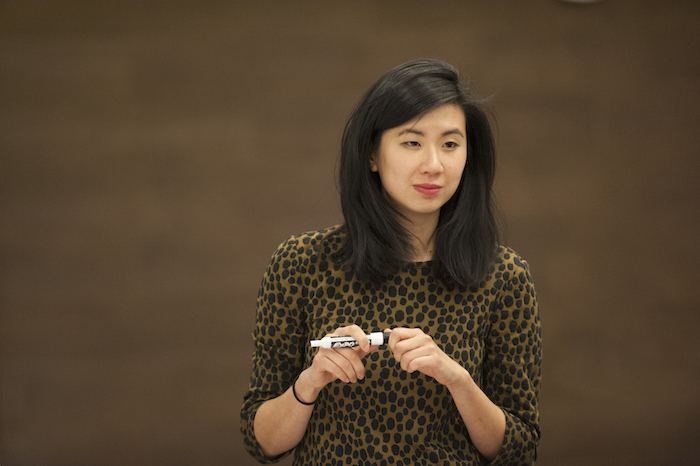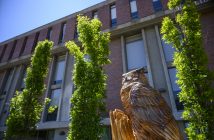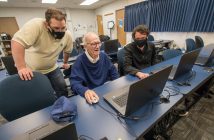The accomplishments of four distinguished faculty members were highlighted in November 2017 at the University’s third annual Campus Teaching Showcase, during which each professor presented an example of her work.
Floris Wilma Ortiz, Ed.D., associate professor of education and the 2011 Massachusetts Teacher of the Year, is driven by love as a teacher and advocates for immigrant, refugee, and second language learners and their families. In the interactive demonstration in November, she presented a sociocultural theoretical framework that incorporates a critical equity lens to complexify teaching and learning. She taught this mini-lesson in Spanish and intended to position participants as academic content and language learners. A brief analysis of the lesson followed, with a discussion on issues of access and (in)equity in education. A question-and-answer session extended the conversation among professors, who shared best practices in making content and language accessible and comprehensible to all learners.
The teaching of Sophia Sarigianides, Ph.D., associate professor of English, is based on a clear anti-racist framework, in theory and practice, to shape students’ knowledge, practices, and lives. Dr. Sarigianides’ pedagogical and political commitment to a stronger vision of democratic education helps her students make sense of and transform the world toward more complex understandings of racism and the ways that societal norms of whiteness coerce suffering and loss of racial identity onto people of color.
In her presentation, Dr. Sarigianides invited attendees to examine a typical thematic interpretation of a multicultural text, featuring characters struggling with their identity. The demonstration introduced a psychoanalytically based theory of racism called “racial melancholia” as a means of offering a complex explanation of the functioning of systemic racism by showing the effects on the protagonist on a seemingly individual level.
Christine von Renesse, Ph.D., professor of mathematics, has been traveling nationally and internationally to facilitate workshops for faculty about how to teach mathematics using inquiry. Instead of listening to a lecture, the students are thinking about carefully chosen questions to discover the mathematical ideas and connections themselves. The curriculum is driven by students’ questions and sense-making, allowing students to be real mathematicians. Dr. von Renesse also contributes to a blog at artofmathematics.org, in which she writes about math explorations and calculus using inquiry-based learning.
Her presentation asked participants to explore a mathematical idea in groups and then share their thinking out loud. Participants looked at the first stages of a growing pattern, then were asked to identify the pattern’s growth and to deduce what stage 100 of the pattern would look like. This activity honored the diversity that different brains bring to the table and showcased how much we can learn from each other.
A gifted literary scholar, Shirley Wong, Ph.D., assistant professor of English, inspires her students to think at a high level and to engage in close textual analysis. During her teaching demonstration, she showcased a “Critical Geography” exercise, which prompted students to examine their racial, socioeconomic, gender, and dis/ability subject positions. Dr. Wong asked students to critically reflect on their own experiences of Westfield State’s campus and analyze how their subjectivities influence the ways in which they experience the University’s campus. Through this exercise, the participants realized that no two people have the “same” experience of campus, and she instructs her students to use this same lens to analyze works of literature that they are discussing in class.




